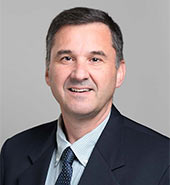SPS Pioneers in IEEE History: Prof. Konstantinos N. (Kostas) Plataniotis

 Professor Konstantinos N (Kostas) Plataniotis is the Bell Canada Endowed Chair in Multimedia and a professor with The Edward S. Rogers Sr. Department of Electrical and Computer Engineering at the University of Toronto (UofT) in Toronto, Ontario, Canada, where he directs the Multimedia Laboratory. He has held the Bell Canada Endowed Chair in Multimedia since 2014. Kostas currently serves as the Director of the Machine Intelligence Major at UofT’s Engineering Science. He was the Director of the Knowledge Media Design Institute (UofT-KMDI) from 2010 to 2012. His research interests primarily include image/signal processing, machine learning, adaptive systems, multimedia and knowledge media, and affective computing. Kostas is a Fellow of IEEE, a Fellow of the Engineering Institute of Canada, a Fellow of the Canadian Academy of Engineering / L' Academie Canadienne Du Genie, and a registered professional engineer in Ontario, Canada.
Professor Konstantinos N (Kostas) Plataniotis is the Bell Canada Endowed Chair in Multimedia and a professor with The Edward S. Rogers Sr. Department of Electrical and Computer Engineering at the University of Toronto (UofT) in Toronto, Ontario, Canada, where he directs the Multimedia Laboratory. He has held the Bell Canada Endowed Chair in Multimedia since 2014. Kostas currently serves as the Director of the Machine Intelligence Major at UofT’s Engineering Science. He was the Director of the Knowledge Media Design Institute (UofT-KMDI) from 2010 to 2012. His research interests primarily include image/signal processing, machine learning, adaptive systems, multimedia and knowledge media, and affective computing. Kostas is a Fellow of IEEE, a Fellow of the Engineering Institute of Canada, a Fellow of the Canadian Academy of Engineering / L' Academie Canadienne Du Genie, and a registered professional engineer in Ontario, Canada.
The recipient of numerous grants and research contracts as principal investigator, he speaks and writes extensively in his field and has been a consultant to several companies. He has lectured in 12 short courses for industry and continuing education programs. He has co-authored more than 500 refereed publications, contributed to seventeen books, co-authored three, and edited two more volumes. He has guest-edited many special issues, including the IEEE Signal Processing Magazine (three times). In 2005 he received the IEEE Canada J.M. Ham Engineering Award for contributions to engineering education and inspirational guidance of graduate students. He is the joint recipient of the 2006 IEEE Trans. on Neural Networks Outstanding Paper Award and the 2018 IET Award.
Kostas has volunteered in committees and units for all three IEEE Boards. At the IEEE level, he served on the IEEE Technical Activities Board's Periodical Review and Advisory Committee (PRAC), was a member of the IEEE Fourier Award committee, and currently chairs the IEEE Jack S. Kilby Signal Processing Medal committee. Kostas has served on the 2008 IEEE Educational Activities Board (EAB) and chaired the EAB's Continuing Professional Education Committee. He served on the IEEE Biometrics Council and chaired the 2009 Examination Committee for its certification program. He also served on the 2006 and 2007 IEEE Admissions and Advancement Committee. His Signal Processing Society (SPS) service includes serving as SPS inaugural Vice President for Membership (2014-206), Signal Processing Letters Editor-in-Chief (2009-2011), Guest editor for SPM and TSIPN, and 2017 GlobalSIP, 2018 ICIP, 2021 ICASSP, and 2027 ICASSP General Co-Chair. At the local level, Kostas served in the IEEE Toronto Section executive committee in various capacities for over a dozen years, including his tenure as the 2004-2005 Chair. During his chairmanship, the Toronto Section was one of the largest IEEE regional units with approximately 4,000 members, including more than 600 students.
We approached Prof. Plataniotis with a few questions, to learn more!
1. What has been the most important factors in your career path?
Without a doubt, luck and good fortune, as I was afforded the opportunity to:
- Study with incredible mentors such as Demetri (DGL) Lainiotis (adaptive learning and control), Tassis (ANV) Venetsanopoulos (signal & image processing), and Subbarayan (Pas) Pasupathy (statistical communications). Their blue-sky thinking, relentless pursuit of academic excellence, and genuine interest in interdisciplinarity coloured my thinking and shaped my research agenda.
- Interact with colleagues and collaborators in an intellectual powerhouse like the University of Toronto (UofT). While the Director of the Knowledge Media Design Institute (KMDI), an interdisciplinary unit at UofT, I had the opportunity to lead exceptionally talented individuals from engineering, computer science, medicine, psychology, architecture, and the fine arts. A truly, life-transforming experience.
- Work with talented undergraduate, graduate, and post-doctoral students at UofT and globally who “made my day” for the last 25 years.
2. What were the main changes in your field during the last 25-30 years?
Signal processing is an enabling technology encompassing theory, applications and algorithms and, as such, was anchored in solid theoretical results mostly following the traditional model-based approach. That changed in about 2012 with the introduction of modern convolution neural networks (G. Hinton, DCS-UofT) and the revival of the data-driven approaches to learning. Their success and massive increases in computing power and data availability created a paradigm shift with data-driven machine learning dominating the research agenda. The open-source movement, the introduction of interdisciplinary research teams, and the free sharing of data, algorithms, code, and support tools fuel further intellectual contributions and accelerate technology developments. To some, the over-reliance on data and empirical analysis is cause for concern. This is precisely where signal processing can make the difference. Its analytical formalisms and means of representation can bridge empiricism and analytical research and lead to verifiable, trustworthy, and scalable technological contributions.
3. What were the main scientific and technological obstacles at the beginning of your career, and have they been addressed?
Limitations on computing power and communications infrastructure. Researching colour image processing and image/video compression in the early nineties using machines that could process only 256 colours with the limited spatial and temporal resolution of the day was a challenge. Demonstrating the incredible waves of innovation, and solid theoretical advances, behind the convergence of wireless communications and image processing was truly Herculean labour. Few today, with all modern sensing and learning technologies that grow with leaps and bounds, can appreciate the challenges of the past. Thankfully, and to a great extent thanks to signal processing research, it is precise that—challenges of the past: new challenges and opportunities beacon on the horizon. Multi-modal, data-driven learning, active and autonomic learning, trustworthy and human-centred solutions, semantic-aware processing, and communications top my list.
4. How does your work affect society?
Training my students at the University of Toronto and elsewhere is probably my most notable contribution as an educator. I have been fortunate to work with many talented individuals who succeeded in academia, working in industry or building their own companies. I often travel either to attend conferences or for educational and professional reasons to the States, the United Kingdom, Europe, China, Singapore and Korea. It’s always a pleasure to meet people who seem to know me through the work and successes of my students. Along the same lines, I consider my early volunteer work at the Signal Processing Chapter and the IEEE Toronto Section equally valuable. Along with many other dedicated volunteers, I will single out Bruno Di Stefano for his passion, vision, and leadership; we pioneered educational offerings for working professionals, encouraged the Section’s members to reflect on the goals and impact of the engineering profession, and connected technical knowledge to social implications of engineering certifications.
5. What are some of the most exciting research areas for students and upcoming researchers?
I wholeheartedly agree with Nicolas Baumard’s[1] assertion that “opportunity is the mother of innovation.” In that sense, the collective intellectual power of our truly global research community, the abundance of data, and the continuing advances in sensing, processing, and communications technologies set the stage for future technological advancements in which signal processing can take center stage. I named a few exciting research topics above. I could add more: human-style learning, personalized medicine, and AI-driven sustainable development. Challenging and undoubtedly worthy.
6. If there is one take-home message you want the readers of this interview to have, what would it be?
Aim at excellence, be open-minded, and keep working. I close by quoting Pasupathy: “Every [research] job is a self-portrait of the person who does it, so autograph your work with excellence.” I cannot think of a better piece of advice.
[1] Nicolas Baumard, Psychological Origins of the Industrial Revolution, Behavior and Brain Sciences, vol. 42, p. e199, January 2019, Cambridge University Press.

